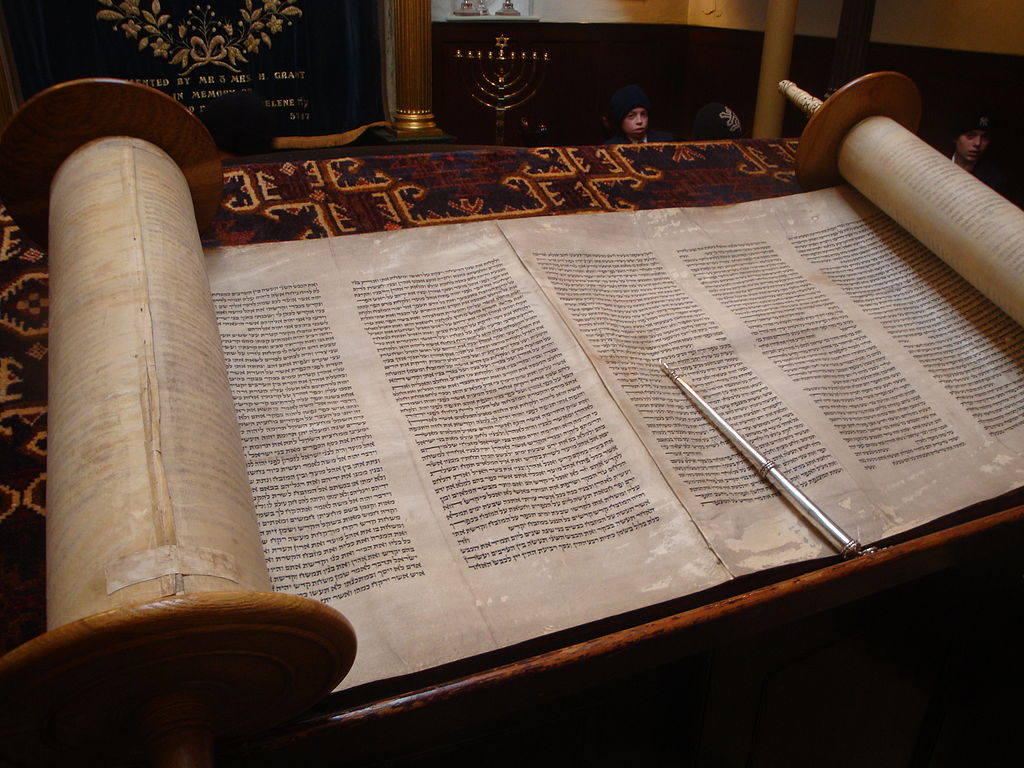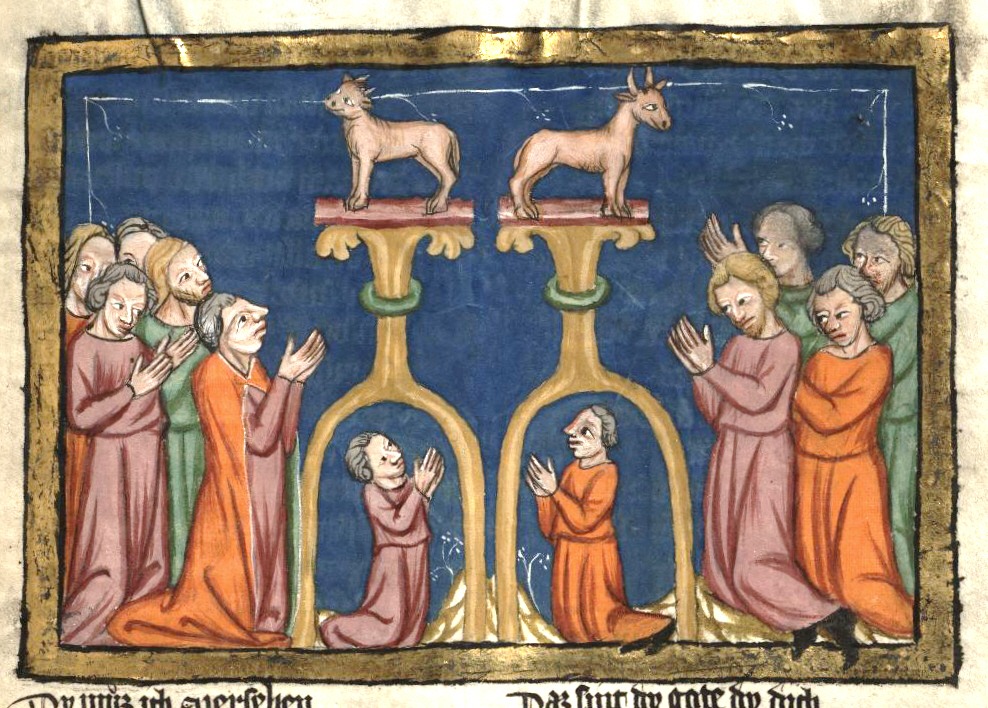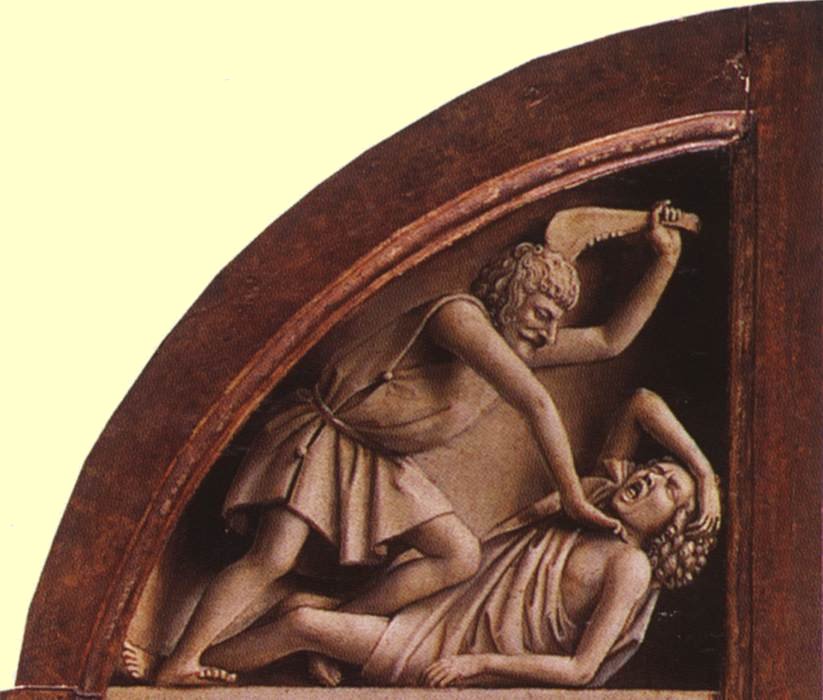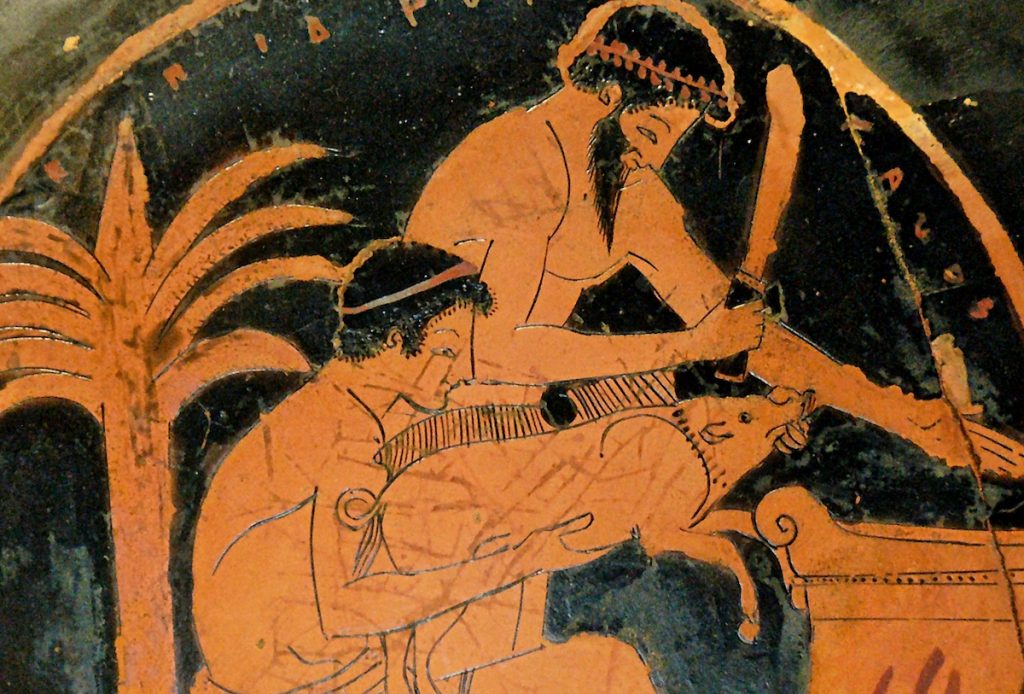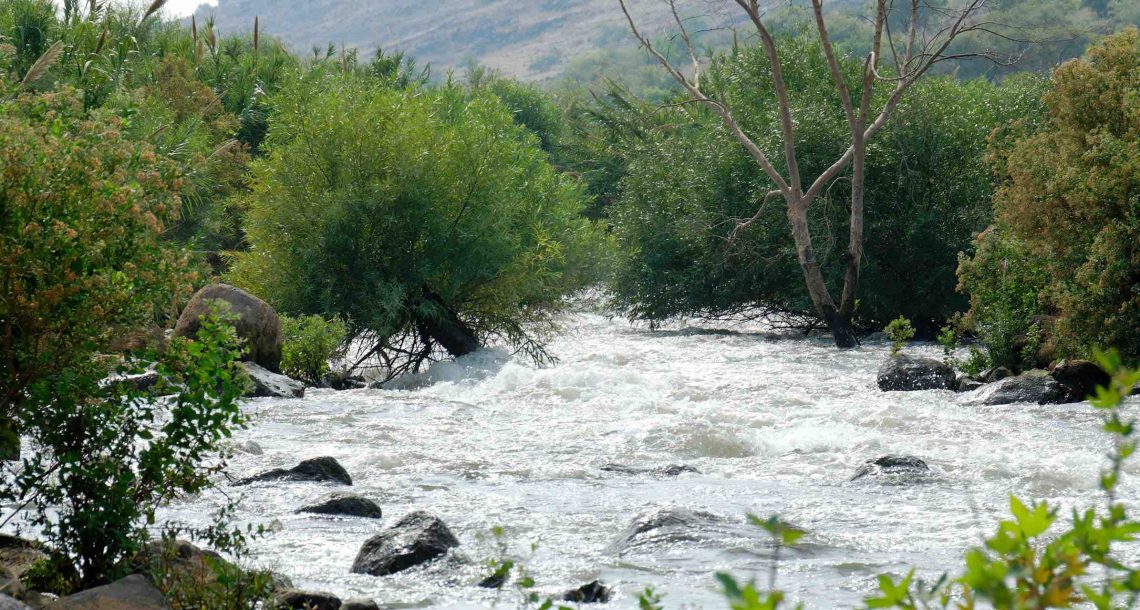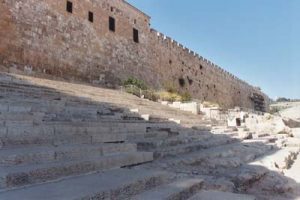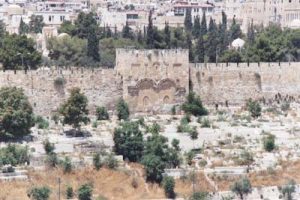The Bible is often hard for us to understand because it comes from a Hebrew-thinking mindset very different than our own. Many words translate one way into English, but actually have a richer meaning in Hebrew that sheds light on many passages.
 It’s also important to have a sense of the spiritual imagery that the Bible uses, to get into the minds of the ancient Israelites and see how they experienced God’s presence in the world. They found pictures of theological concepts in the world around them, and God communicated with them through them. Jesus also uses these images to tell about himself, and we need to understand his culture to comprehend his message.
It’s also important to have a sense of the spiritual imagery that the Bible uses, to get into the minds of the ancient Israelites and see how they experienced God’s presence in the world. They found pictures of theological concepts in the world around them, and God communicated with them through them. Jesus also uses these images to tell about himself, and we need to understand his culture to comprehend his message.
One prominent image that recurs from Genesis to Revelation is that of living water. In the Middle East, water is scarce and precious, and very much needed for survival. Only a few months of the year does rain fall in Israel, and the rest of the time the ancient peoples survived on stagnant water that was stored in cisterns in the ground. When rain does fall after many months of clear blue skies, it seems to be a miraculous gift from God.
The difference with or without rain in Israel is amazing – the hills can be barren and brown much of the year, but after a season of rain, covered in green meadows and flowers. Where there are rivers, lush vegetation surrounds them, while only yards away, all is barren.
Out of this arose the idea of living water, or mayim chaim (MY-eem KHY-eem), which refers to water in the form of rain or flowing from a natural spring, which has come directly from God, not carried by human hands or stored in cisterns. It also is a contrast to sea water, especially that of the Dead Sea, which looks refreshing but is poisonous, and makes the land around it barren.
Living water was strongly associated with the presence of God. Many times in the scriptures, God is called the source of living water.
From Eden, where God dwelled with man, a river welled up that formed the headwaters of four mighty rivers. (Gen 2:10).
Psalm 29:10 pictures God sitting “enthroned over the flood.”
In Revelation, the river of life flows out from under the throne of God (Rev. 22:1).
In Jeremiah it says,
O LORD, the hope of Israel, all who forsake you will be put to shame. Those who turn away from you will be written in the dust because they have forsaken the LORD, the spring of living water. (Jer. 17:13)
Even other nations understood this picture of the gods being associated with sources of living water. Pagans of the first century who worshiped Pan set up their shrines at the great cave from which the Jordan emerged at Caesarea Philippi, north of Galilee, and called it the “Gates of Hades”. This image was common to many cultures of that area, and God used that image to teach his people about himself.
.
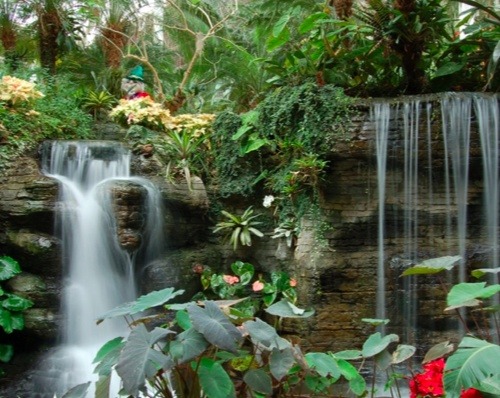
.
Spiritual Lesson: Water in Israel and Egypt
One lesson that the ancient Hebrews would have learned about God’s ways came from the contrast in the water sources of Egypt and Israel. In Deuteronomy 11:10 – 12 it says,
The land you are entering to take over is not like the land of Egypt, from which you have come, where you planted your seed and irrigated it by foot as in a vegetable garden. But the land you are crossing the Jordan to take possession of is a land of mountains and valleys that drinks rain from heaven. It is a land the LORD your God cares for; the eyes of the LORD your God are continually on it from the beginning of the year to its end.
The difference between Egypt and the promised land of Canaan was that in Egypt almost no rain fell, and crops were entirely irrigated by the flooding Nile and by the labor of hand-watering, while in Canaan the land was entirely watered by rain from God. While Egypt didn’t feel the presence of God through rain, it achieved its secure food source through human effort. Egypt and Canaan, therefore, were a contrast of security of human effort compared to dependence on God. The Egyptians were even aware of the difference between their land and others – one Greek historian quotes them as feeling this way:
“If the gods shall some day see fit not to grant the Greeks rain, but shall afflict them with a long drought, the Greeks will be swept away by a famine, since they have nothing to rely on but rain from Zeus, and have no other resources for water.” (Heroditus 2:13)
And in fact, in Genesis we hear that Abraham and Isaac are forced to go to Egypt several times when a drought overtakes Canaan, and of course during Joseph’s time, that is what brings the entire family to Egypt to survive.
There was a spiritual lesson for the Israelites when they left the land of Egypt for the promised land of Canaan — that when God chose a land for his people, he didn’t choose a place where they could have security because of their own efforts, he chose a land where they would be far more dependent on him and would need his presence watching over them to send them the living water of rain.
Many Christians have seen God do the same thing in their own lives, when they step out to follow him and he takes them from security of their own effort and brings them to a point of dependence on him, which doesn’t always include prosperity as the world sees it.
In like manner, even though Israel is the “Promised Land,” in many places the land is not nearly as lush as Egypt. It is interesting that God often desires dependence for his people rather than abundance, as our “prosperity gospel” teachers may tell us.

Living Water as the Holy Spirit
For the Israelites, the presence of rain in Israel was very much associated with blessing by God, and its absence with his disapproval. Almost every prophet decreed that drought would come as a punishment for their sins. But God’s redemption was likened to him sending abundant rain, giving them living water to drink:
Then will the eyes of the blind be opened and the ears of the deaf unstopped. Then will the lame leap like a deer, and the mute tongue shout for joy. Water will gush forth in the wilderness and streams in the desert. The burning sand will become a pool, the thirsty ground bubbling springs. (Isaiah 35:5-7)
Because living water came directly from God, it was closely associated with God’s Spirit in the world. When God promised to redeem his people, he promised to send his Spirit:
For I will pour out water on the thirsty land, and streams on the dry ground; I will pour out My Spirit on your offspring and My blessing on your descendants; and they will spring up among the grass like poplars by streams of water. (Isaiah 44:3 – 4)
In Joel, the outpouring of God’s Spirit in the last days is closely associated with living water:
Be glad, O people of Zion, rejoice in the LORD your God, for he has given you the autumn rains in righteousness. He sends you abundant showers, both autumn and spring rains, as before… Then you will know that I am in Israel, that I am the LORD your God, and that there is no other; never again will my people be ashamed. And afterward, I will pour out my Spirit on all people. Your sons and daughters will prophesy, your old men will dream dreams, your young men will see visions. Even on my servants, both men and women, I will pour out my Spirit in those days. (Joel 2:23, 27-29)
This image of living water is therefore an important feature of the ministry of Jesus. In the book of John, he explains that he is the one who truly brings living water into the world. He says to the Samaritan woman,
Everyone who drinks of this water will thirst again; but whoever drinks of the water that I will give him shall never thirst; but the water that I will give him will become in him a well of water springing up to eternal life. (John 4:13-14)
And later, during the feast of Sukkot, on the last and greatest day, when the prayers of Israel were an impassioned plea for God to bless them with rain, Jesus stood up and shouted, saying,
“If anyone is thirsty, let him come to Me and drink! He who believes in Me, as the Scripture said, ‘From his innermost being will flow rivers of living water.’” But this he spoke of the Spirit, whom those who believed in him were to receive; for the Spirit was not yet given, because Jesus was not yet glorified. (John 7:37 – 39)
An interesting rabbinic insight is that “living water” is also understood to mean a true knowledge of God. Certainly this is associated with the Holy Spirit, who teaches us God’s will and guides and directs us. And certainly it is associated with Jesus’ ministry of revealing God’s true character by Jesus’ sacrificial love for us. It is in contrast with that of “brackish water” like that of the Dead Sea, which is a false knowledge of God, that false prophets and twisted doctrines yield. Although it looks fine to the eye, it is quite poisonous!
And, in Hebrew, the word for knowledge, da’at, carries the connotation of intimacy and care, as when we know a person, we care for them. So, living water as knowledge of God really means an intimate relationship with him, which is what the Spirit gives us.

.
A Beautiful Prophecy of Living Water
In Ezekiel 47, there is a wonderful picture of living water. The prophet Ezekiel is at the temple, and sees a little trickle of water flowing out from under the alter. The water flows out of the temple down the south stairs. A thousand cubits from the temple, the strange flow of water has grown ankle-deep, and a thousand more cubits it is knee-deep, and a thousand more it is waist deep, and finally it becomes a stream so deep and wide that it can’t be crossed. This paradoxical river does a strange thing – it gets fuller as it flows away from its source. How can that be?
Moreover, this little stream from the temple is flowing southeast out of Jerusalem toward the Dead Sea, twelve miles away. The land to the east of Jerusalem is arid, and the area near the Dead Sea is a poisoned salt wasteland where absolutely nothing can live. But this stream has a marvelous affect:
On the bank of the river there were very many trees on the one side and on the other. Then he said to me, “These waters go out toward the eastern region and go down into the Arabah; then they go toward the sea, being made to flow into the sea, and the waters of the sea become fresh. “It will come about that every living creature which swarms in every place where the river goes, will live. And there will be very many fish, for these waters go there and the others become fresh; so everything will live where the river goes. “
And it will come about that fishermen will stand beside it; from En-Gedi to En-Eglaim there will be a place for the spreading of nets. Their fish will be according to their kinds, like the fish of the Great Sea, very many. “But its swamps and marshes will not become fresh; they will be left for salt. “By the river on its bank, on one side and on the other, will grow all kinds of trees for food. Their leaves will not wither and their fruit will not fail. They will bear every month because their water flows from the sanctuary, and their fruit will be for food and their leaves for healing.” (Ezek 47:7-12)
 It is beautiful to see how the image of this river of life flowing from the temple in Ezekiel 47 describes the outpouring of the Spirit that occurred at Pentecost. Of course, the Spirit first fell on the people in the temple as they were worshiping there, as tongues of flame settled on them. It was as if the Spirit started trickling out of the sanctuary to that little “puddle” of believers.
It is beautiful to see how the image of this river of life flowing from the temple in Ezekiel 47 describes the outpouring of the Spirit that occurred at Pentecost. Of course, the Spirit first fell on the people in the temple as they were worshiping there, as tongues of flame settled on them. It was as if the Spirit started trickling out of the sanctuary to that little “puddle” of believers.
Interestingly, when Peter preached to the people at the temple at Pentecost, he was probably standing on the south stairs, where the water in Ezekiel’s vision flowed! That is a large public gathering place where the worshippers entered the temple, a common site of public teaching. Also on that south stairs are the mikvehs (ceremonial baths), where 3000 people that day were baptized in living water. They have been excavated and are visible even today.
The trickle of God’s Spirit became ankle deep as the first believers shared the gospel and many in the city believed, and then knee deep as they carried the gospel to the surrounding countries. Instead of running out of energy as it flowed, the river of God’s Spirit got deeper and wider as it flowed! And its ultimate destination is that of the most desolate of wastelands, full of the poisonous, brackish water of the Dead Sea. This is the dark reality of a world devoid of a true knowledge of God. Anywhere it touches it gives new life and an intimate relationship with God where there was only death before.
We were all the more touched by the fact that one of the places where this river of life flows is En-Gedi, the image we chose for our name. We knew that En-Gedi is an oasis full of waterfalls that show the image of living water. But only after studying this passage did we realize that En-Gedi is fed by waters that come down from the mountain of Jerusalem, and are right at the edge of this “River of Life” of God’s Holy Spirit that he is pouring out on the world.
What is God’s final plan for this river that gets deeper and wider as it flows?
The earth shall be filled with the knowledge of the glory of the Lord as the waters cover the sea. (Habakkuk. 2:14, Isaiah 11:9)
~~~~~
For more devotional articles based on living water, see this page.
 According to Acts, the reason Christians have not been required to observe the Torah was not because it has ended, but because we are Gentiles (at least most of us).
According to Acts, the reason Christians have not been required to observe the Torah was not because it has ended, but because we are Gentiles (at least most of us).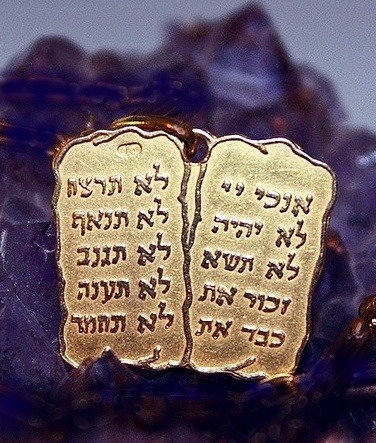 Why would torah be translated as law? Because when God instructs his people how to live, he does it with great authority. His torah demands obedience, so the word takes on the sense of “law.” But in Jewish parlance, torah has a very positive sense, that our loving Creator would teach us how to live. It was a joy and privilege to teach others how to live life by God’s instructions. This was the goal of every rabbi, including Jesus.
Why would torah be translated as law? Because when God instructs his people how to live, he does it with great authority. His torah demands obedience, so the word takes on the sense of “law.” But in Jewish parlance, torah has a very positive sense, that our loving Creator would teach us how to live. It was a joy and privilege to teach others how to live life by God’s instructions. This was the goal of every rabbi, including Jesus.